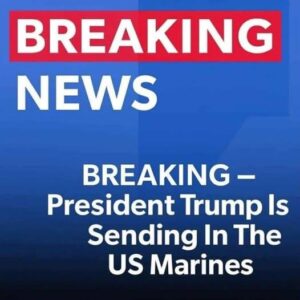President Donald Trump announced on Saturday that a recent U.S. military operation in the Caribbean successfully destroyed a “very large drug-carrying submarine,” resulting in the deaths of two suspected narcotics traffickers and the capture of two others. Trump also released video footage of the strike, highlighting what he described as a significant effort to curb drug smuggling toward the United States.
The operation, according to Trump, targeted a vessel transporting primarily fentanyl and other illicit narcotics along a “well-known narcotrafficking transit route” heading toward U.S. shores. Trump’s statement, posted to Truth Social, emphasized the operation’s potential to save American lives:
“This interdiction prevented as many as 25,000 American overdose deaths. No U.S. Forces were harmed in this strike. Under my watch, the United States of America will not tolerate narcoterrorists trafficking illegal drugs, by land or by sea.”
Details of the Operation
Fox News reported that the U.S. Navy rescued two survivors from the destroyed submarine, who were taken aboard an American warship. According to Trump, these individuals are currently in custody, though their identities and nationalities have not been officially disclosed beyond the president’s announcement.
This strike marks the sixth interdiction of a suspected drug-smuggling vessel in the Caribbean since the initiation of U.S. operations in the region last month. While the Pentagon has not publicly released the operation’s official name or many tactical details, Trump indicated that the strike was part of a broader effort to disrupt major narcotics trafficking networks.
During a meeting on Friday with Ukrainian President Volodymyr Zelenskyy at the White House, Trump publicly referenced the submarine strike for the first time.
“We attacked a submarine, and that was a drug-carrying submarine built specifically for the transportation of massive amounts of drugs,” Trump said.
Secretary of State Marco Rubio, speaking separately, did not dispute the strike’s occurrence or the presence of survivors but noted that additional operational details would be released in due course.
Background on Drug Smuggling and Fentanyl
Fentanyl, a synthetic opioid primarily manufactured in Mexico using precursor chemicals supplied from China, has contributed to a national crisis in the United States. According to federal statistics, thousands of Americans die each year from fentanyl overdoses, making it one of the deadliest drugs circulating in the country.
The Trump administration’s announcement underscores the ongoing federal efforts to intercept shipments before they reach U.S. territory. Fentanyl’s lethality and high potency have prompted calls from lawmakers across the political spectrum for tougher penalties on traffickers and stronger interdiction measures.
In May 2023, Georgia Republican Rep. Marjorie Taylor Greene proposed a legislative amendment that would impose the death penalty on anyone caught knowingly smuggling fentanyl into the United States. Greene highlighted the devastating impact of the drug, stating:
“300 Americans are murdered each day by fentanyl. It’s the leading killer of young people, 18-34, in America. Today, I introduced an amendment to H.R. 467 to give the death penalty to criminals who intentionally or knowingly import fentanyl across our Southern border.”
Several Republican lawmakers have since pushed for stricter legislation targeting fentanyl traffickers, emphasizing border security and drug interdiction as national priorities.
U.S. Military and CIA Involvement
Trump confirmed earlier this week that he had authorized CIA operations in the Caribbean as part of a coordinated effort to disrupt narcotics trafficking networks. The operations reportedly involved U.S. Air Force B-52 bombers, which conducted a visible show of force near Venezuelan waters, signaling U.S. readiness to act against drug smuggling routes.
Military officials have described the submarine as “very large,” capable of carrying massive quantities of narcotics covertly across international waters. While traditional interdictions often focus on boats or trucks, submarines present unique challenges due to their stealth and limited detection by conventional maritime surveillance.
“These submarines are specifically engineered for smuggling,” a defense analyst said. “Interdicting one of these vessels requires intelligence, precision, and coordination across multiple branches of the U.S. military and federal agencies.”
Trump framed the operation as part of a broader commitment to combat “narcoterrorism” and protect American citizens from the ongoing fentanyl crisis.
Political and Public Reactions
The announcement drew attention from both supporters and critics. Trump supporters praised the operation as a decisive measure to protect American lives and highlighted the administration’s willingness to take direct action against drug trafficking networks.
“This is the kind of leadership America needs,” said a spokesperson for a conservative advocacy group. “Stopping these shipments before they reach U.S. communities saves lives and disrupts violent criminal networks.”
Critics, however, questioned the timing and messaging of the announcement, arguing that using military force in the Caribbean carries potential risks of escalation. Some observers cautioned that more transparency is needed regarding the identities of the captured suspects and the exact intelligence that led to the strike.
“While drug interdiction is critical, the use of military force outside U.S. borders always raises legal and diplomatic questions,” said a former State Department official.
Implications for Drug Policy
The submarine strike highlights the increasing complexity of international drug trafficking and the lengths traffickers will go to transport fentanyl and other narcotics. Unlike land-based routes, maritime smuggling allows for high-volume shipments with minimal immediate detection, making preemptive interdiction essential.
Law enforcement officials note that fentanyl’s potency makes even small shipments lethal. A single kilogram can yield hundreds of thousands of doses, amplifying the threat posed by transnational narcotics networks.
Trump’s statement framed the strike as not only a tactical success but also a preventative measure against widespread overdose deaths in the U.S. By removing the submarine and its cargo from circulation, he claimed the operation could prevent tens of thousands of fatalities.
Looking Ahead
With ongoing operations in the Caribbean and continued CIA and military coordination, U.S. authorities appear determined to disrupt narcotics routes and dismantle trafficking networks before drugs reach American communities. Officials suggest that the Caribbean remains a critical corridor for fentanyl and other illicit substances destined for the United States, emphasizing the need for sustained vigilance.
Trump has consistently used these operations to highlight his approach to border security and narcotics enforcement, framing it as both a law-and-order initiative and a matter of public health.
“Under my watch, the United States will continue to confront narcoterrorists wherever they operate — by land or by sea,” Trump said in his Truth Social post, reinforcing his administration’s focus on national security and anti-drug initiatives.
While additional details on the operation and follow-up actions remain limited, the strike serves as a high-profile example of U.S. efforts to combat the fentanyl epidemic and stop large-scale drug smuggling operations before they can harm American communities.





